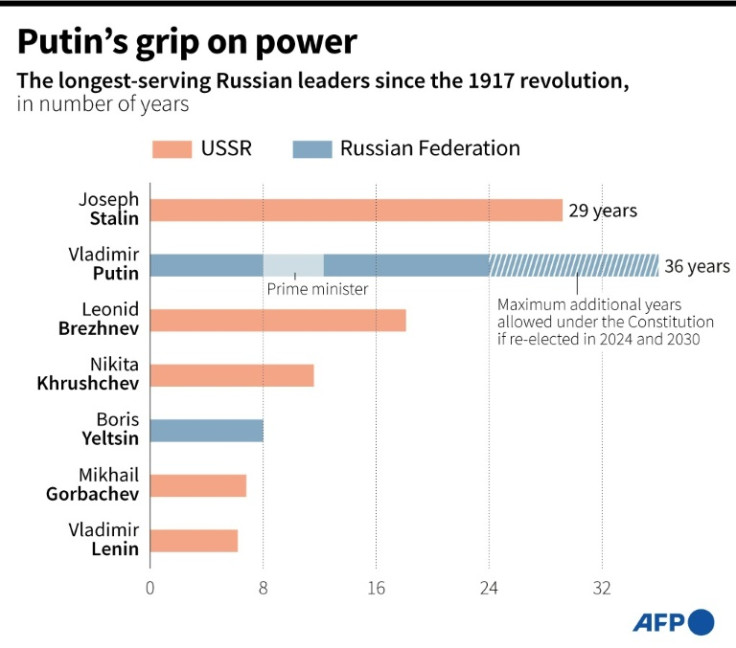Newly-confident Putin Vows Victory In Ukraine

President Vladimir Putin voiced renewed confidence Thursday in Russia's offensive in Ukraine, as he staged a marathon press conference a week after announcing plans to stay in the Kremlin until at least 2030.
Looking relaxed and bolstered by Kyiv's recent struggles on the battlefield, the 71-year-old Russian leader brushed off nearly two years of Western sanctions and reaffirmed his maximalist goals in Ukraine.
"There will be peace when we achieve our goals," Putin said, speaking at his first end-of-year press conference since Russia sent troops into Ukraine in February 2022.
"They are not changing. I will remind you what we talked about: the de-nazification and de-militarization of Ukraine, and its neutral status," Putin said, adding that Russian forces were "improving their position on almost the entire line of contact".
Putin's nationally televised appearance came at one of the lowest points for Ukraine of the entire campaign.
Its summer counteroffensive petered out without making much progress and its Western support is fraying due to growing fatigue amid some US lawmakers in Washington and frictions within the European Union.
Putin appeared to point to these, stressing that nearly two years of Western sanctions and international isolation had done little to hurt Russia's economy or morale.
"There is enough for us not only to feel confident, but to move forward," Putin said.
The echoes of Russia's military operation reverberated in the grand hall in central Moscow where hundreds of journalists passed four police checkpoints to hear Putin speak.
Russia said it had downed nine Ukrainian drones heading for Moscow just hours before Putin's event was set to kick off.
Ukraine said it had shot down 41 of the 42 Iranian-designed drones launched by Russian forces at the southern city of Odesa, in a barrage that wounded 11 people.
Putin's choreographed call-in show was cancelled last year as Moscow reeled from the shock of early failures of its military operation, where Ukraine managed to repel the Kremlin's assault on Kyiv and then regain territory in the east and south.
Ukraine's strong resistance and support from its allies had surprised observers around the world and in Moscow, where many had expected to conquer Kyiv in a few days.
But almost two years into his offensive, Putin appears to be sensing the tide turning in his favour.
Putin's call-in show coincided with a crucial summit in Brussels during which Ukraine had hoped to secure a clear path to membership of the European Union.
But that drive has been hampered by Hungarian Prime Minister Viktor Orban, a Putin ally who has caused anguish in both Kyiv and Brussels but standing firmly against Ukraine's membership.
Orban reaffirmed that position before the start of official talks in Brussels on Thursday, telling reporters that Ukraine had not yet met the "merit-based" criteria to join the 27-nation bloc.
"There is no reason to discuss anything because preconditions were not met," Orban said.
Russia's military resurgence prompted NATO chief Jens Stoltenberg to warn Thursday that Putin could attack other countries if Western military support for Kyiv fades.
"If Putin wins in Ukraine, there is real risk that his aggression will not end there," Stoltenberg said in Brussels.
"Our support is not charity -- it is an investment in our security," he said.
Putin was bolstered also by Ukrainian President Volodymyr Zelensky's visit this week to Washington, where he failed to overcome Republican opposition in Congress to approving a new $60-billion aid package.
Moscow, meanwhile, is still able to sustain its military effort through oil sales, which Putin discussed during a trip this month to the UAE and Saudi Arabia where he was received with full honours.
In any case, Putin's re-election campaign, which he launched last week, is unlikely to be forced to address the real economic and human costs of the offensive.
His biggest challenge since the start of the operation came during a wave of protests that sprung up in response to a military call-up that the Kremlin organized in the summer of 2022.
The fear of being enlisted in the army set off temporary panic among draft-age men, prompting tens of thousands to flee into neighboring former Soviet republics and countries such as Turkey.
Putin said Thursday that Russia had already "recruited" 486,000 people into the armed forces, adding 1,500 people every day.
"To date, there is no need for a new mobilization," he said.
Any political resistance to Putin has also been muzzled by an intensifying crackdown on dissent.
Putin's most high-profile rival, Alexei Navalny, is currently serving a 19-year prison sentence on political charges.

© Copyright AFP 2025. All rights reserved.





















